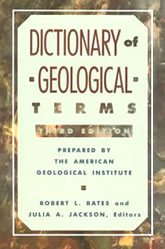Geological Terms Beginning With "O"
For terms beginning with other letters, please click below
|
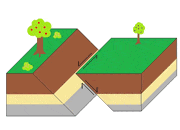
Oblique-Slip Fault
A fault that has both horizontal and vertical elements of displacement.
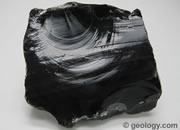
Obsidian
A glassy igneous rock with a composition similar to granite. The glassy texture is a result of cooling so fast that mineral lattices were not developed.
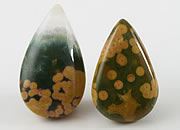
Ocean Jasper
A gem material named because it is found below the high tide line of a Madagascar ocean beach. It is patterned with beautiful eyes and bands in a wide variety of colors. It also can grade from agate to jasper in a single stone.

Offshore
The geographic area that is seaward of a coastline. The photo shows an offshore drilling platform.

Oil Field
The geographic area above an underground accumulation of oil and natural gas.
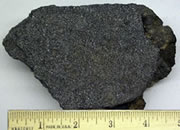
Oil Sand
Also known as "tar sand." A porous sand or sandstone that contains asphalt or bitumen within its pore spaces. Sometimes the name "oil sand" is used for a deposit in which the hydrocarbon is in a liquid form and the name "tar sand" is reserved for those deposits in which the hydrocarbon is in the form of solid asphalt or bitumen.
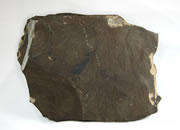
Oil Shale
A dark-colored shale containing an unusual amount of solid organic material known as kerogen. This shale can be crushed and heated to liberate gaseous and liquid hydrocarbons. At present the expenditure required to process oil shale into a fuel makes this effort marginally profitable or unprofitable.
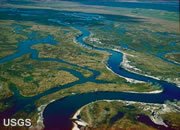
Old Age
A stage in the development of a landscape when streams have a low gradient and meander back and forth across broad floodplains. The landscape is marked by meander scars and oxbow lakes.
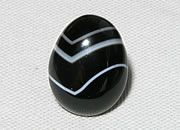
Onyx
Onyx is the name given to a black chalcedony with parallel white banding or a red chalcedony with white banding. High-quality pieces are sometimes used to carve cameos.
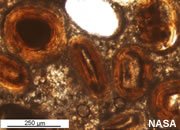
Oolite
A small sphere of calcium carbonate no more than a few millimeters in diameter and with a concentric internal structure. These spheres are thought to have formed by inorganic precipitation of calcium carbonate in very thin layers around a grain of sand or a particle of shell or coral. A rock composed primarily of oolites.

Oolitic
A limestone texture that is characterized by spherical grains of calcium carbonate with a concentric internal structure. These grains are thought to form by inorganic precipitation of calcium carbonate around a sand grain or shell particle nucleus.
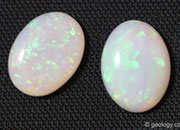
Opal
A hydrous silicon dioxide mineraloid that is used as a gemstone. Opals that display an iridescent play-of-color (like the cabochons in the photo) are called precious opal. Opals that do not show play-of-color are called common opal.
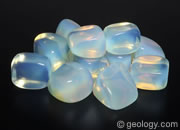
Opalite
"Opalite" is a word that can be used to refer to either common opal (natural opal that does not exhibit play-of-color), or, an opalescent material made of glass or plastic. The accompanying photo shows a man-made material marketed as "opalite."
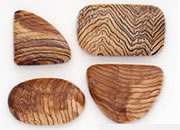
Opalized Wood
A type of petrified wood that is composed of opal, usually common opal, rather than chalcedony or another mineral material.
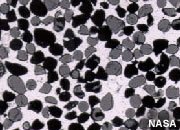
Opaque
An adjective used in reference to a substance that does not allow light of visible wavelength to enter or pass through. Minerals with a metallic or submetallic luster are normally opaque. The image shows soil spherules from the moon in transmitted light. The black spherules are opaque and do not allow the passage of light.
Ophiolite Suite
The typical sequence of rocks in the oceanic crust: from bottom to top: ultrabasic rocks, gabbro, sheeted dikes, pillow basalts, and sea-floor sediments. Igneous rocks and deep-sea sediments associated with divergence zones and the sea-floor environment.
Orbit
An elliptical or hyperbolic path traveled by a satellite object around a more massive body. For example, the Earth orbits the Sun.
Ore Deposit
A natural accumulation of a metal, gemstone or other valuable mineral substance, which is rich enough in concentration that it can be mined and processed at a profit.
Ore Mineral
A mineral that contains a high enough concentration of a useful element or compound that the element or compound can be extracted at a profit.
Original Horizontality
One of the principles of relative dating. Based upon the good assumption that sedimentary rocks are deposited in horizontal or nearly horizontal layers; then if sedimentary layers are found in an inclined orientation the force that moved them to that orientation must have been applied at some time after their deposition.
|
Dictionary of Geological Terms - Only $19.99 All scientific disciplines have an essential vocabulary that students and professionals must understand to learn and communicate effectively. A geology dictionary that is used regularly is one of the most important tools for developing professional competence. A good dictionary should be on the desk of every geologist and within easy reach. This dictionary is compact and inexpensive at only $19.99. More information. |
Orogenic Belt
A linear or arcuate region of folded and uplifted rocks.
Orogeny
A compressive tectonic process that results in intense folding, reverse faulting, crustal thickening, uplift and deep plutonic activity. A mountain-building episode.
Oscillation Ripple Marks
Symmetrical ridges in sand or other sediment that are caused by a back-and-forth wave action.
Outcrop
An exposure of bedrock. Outcrops can be formed naturally or by human action. Stream erosion and highway construction can produce outcrops.
Outfall
A location where water is discharged. Normally used in reference to where a water treatment facility releases treated water into the environment.
Outgassing
The release of juvenile gases and water to the surface from a magma source.
Outwash
Sorted and stratified sediment deposited in front of a glacier by meltwater streams.
Overturned Fold
A fold that has both limbs dipping in the same direction, resulting from one of those limbs being rotated through an angle of at least 90 degrees. Overturned folds are found in areas of intense deformation. The name overturned is given because the strata on one limb of the fold are "overturned" or upside down.
Oxbow Lake
A crescent-shaped lake that forms when a meandering stream changes course. Such changes in course frequently occur during flood events when overbank waters erode a new channel.
Oxidation
A chemical reaction in which substances combine with oxygen. For example, the combination of iron with oxygen to form an iron oxide.
|
| More General Geology |
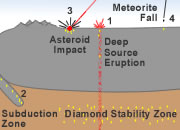 |
Diamonds from Coal? |
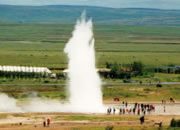 |
What is a Geyser? |
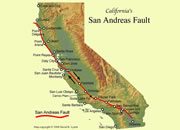 |
What is the San Andreas Fault? |
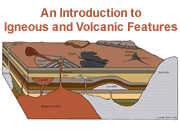 |
Igneous and Volcanic Features |
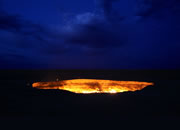 |
The Doorway to Hell |
 |
Topo Maps |
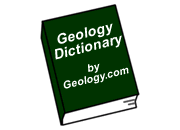 |
Geology Dictionary |
 |
Gifts That Rock |

Find Other Topics on Geology.com:
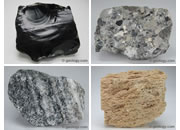
|
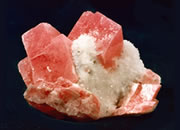
| ||

|

| ||
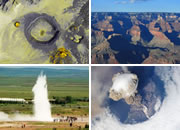
|

| ||

|
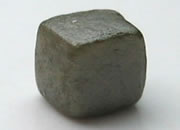
|

